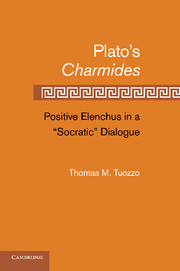Book contents
- Frontmatter
- Contents
- Acknowledgments
- Part One Approaching The Dialogue
- Part Two Approaching The Argument
- Part Three The Dialectical Investigation
- 5 σωϕροσύνη and Its Value
- 6 σωϕροσύνη as Self-Knowledge: Two Reformulations
- 7 Possibility of Self-Knowledge: Critian Formulation
- 8 Possibility of Self-Knowledge: Socratic Formulation
- 9 Return of the Value Question
- 10 Socrates??? Final Speech and Closing Scene
- 11 σωϕροσύνη, Knowledge, and the Good
- Works Cited
- General Index
- Index of Passages
10 - Socrates??? Final Speech and Closing Scene
Published online by Cambridge University Press: 05 February 2012
- Frontmatter
- Contents
- Acknowledgments
- Part One Approaching The Dialogue
- Part Two Approaching The Argument
- Part Three The Dialectical Investigation
- 5 σωϕροσύνη and Its Value
- 6 σωϕροσύνη as Self-Knowledge: Two Reformulations
- 7 Possibility of Self-Knowledge: Critian Formulation
- 8 Possibility of Self-Knowledge: Socratic Formulation
- 9 Return of the Value Question
- 10 Socrates??? Final Speech and Closing Scene
- 11 σωϕροσύνη, Knowledge, and the Good
- Works Cited
- General Index
- Index of Passages
Summary
Critias’ guarded agreement at 175a8 that the full-fledged knowledge of knowledge would not be beneficial brings to an end the two-part program that Socrates had announced at the new beginning at 167a–b. Plato does not have Socrates propose yet another new beginning, nor does he have him return to take up issues mentioned or implied by the previous discussion. These are tasks for the reader. Instead, Plato has Socrates give a speech in which he summarizes their discussion from the new beginning on. This summary speech, both in what it emphasizes and in what it neglects, supplies some further indications of how the reader may continue the investigation. At the end of this speech Socrates then returns to the question that had initiated the entire discussion of σωϕροσύνη: whether Charmides is in possession of that virtue. This in turn leads into a brief final conversation between Socrates and Charmides, within which is embedded a short conversation between Charmides and Critias. In this final scene, some of the themes of the introductory scene are sounded once again, this time taking on deeper significance in light of points made in the intervening investigation.
Socrates??? Speech
Socrates begins his final speech by emphasizing how the conclusion of their recent argument, that σωϕροσύνη brings no benefit, vindicates the qualms he had earlier expressed (172c4) about their discussion:
Do you see, Critias, how reasonable it was of me to be afraid a little while ago, and how justly I accused myself of not conducting a worthy investigation (οὐδὲν χρηστὸν … σκοπῶ) into σωϕροσύνη? For that which is agreed to be the finest thing (κάλλιστον) of all would not have turned out to be useless (ἀνωϕελές), if I had been of any use for fine inquiry (εἴ τι ἐμοῦ ὄϕελος ἦν πρὸς τὸ καλῶς ζητεῖν). (175a9–b2)
- Type
- Chapter
- Information
- Plato’s CharmidesPositive Elenchus in a 'Socratic' Dialogue, pp. 287 - 303Publisher: Cambridge University PressPrint publication year: 2011



